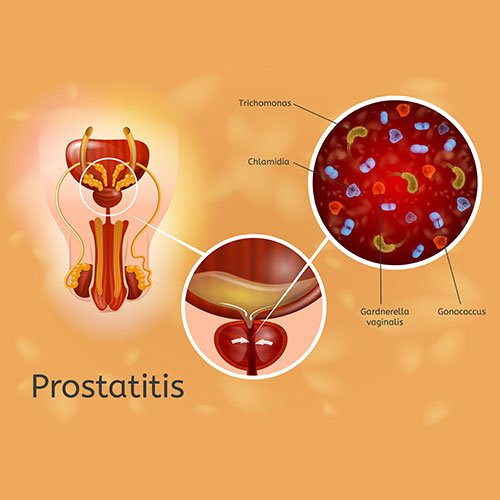Prostatitis is an inflammation of the prostate gland, which can cause a range of symptoms affecting urinary and sexual function. It can be acute or chronic, and its causes can vary.

Types of prostatitis include:
- Acute Bacterial Prostatitis: A sudden bacterial infection of the prostate. It is considered a medical emergency and may present with severe symptoms such as:
- High fever
- Chills
- Severe pelvic pain
- Painful urination
- Nausea and vomiting
- Difficulty urinating
- Chronic Bacterial Prostatitis: A less common but persistent bacterial infection of the prostate. Symptoms are similar to acute prostatitis but may be less severe and can include:
- Persistent pelvic pain
- Frequent urination
- Painful urination
- Pain during or after ejaculation
- Chronic Prostatitis/Chronic Pelvic Pain Syndrome (CP/CPPS): The most common form of prostatitis, which is not caused by bacterial infection. It includes:
- Type IIIA: Inflammatory CPPS, where inflammation is present but no bacterial infection is found.
- Type IIIB: Non-inflammatory CPPS, where no inflammation is present and no bacterial infection is detected.
- Asymptomatic Inflammatory Prostatitis: Inflammation of the prostate without any noticeable symptoms.
Diagnosis of prostatitis may involve:
- Medical history and physical examination
- Digital rectal exam (DRE) to assess the prostate
- Urinalysis to check for infection or other abnormalities
- Prostate secretions or urine tests to detect bacteria
- Imaging studies, such as ultrasound or MRI, if needed
Homoeopathy Treatment
In homeopathy, treatment for prostatitis is individualized based on the specific symptoms and overall health of the patient. Homeopathic remedies aim to stimulate the body’s natural healing processes . Some remedies that might be considered for prostatitis include:
- Cantharis: For intense burning pain during urination, with a feeling of urgency and incomplete bladder emptying. This remedy is often used when pain is severe and causes distress.
- Sabal Serrulata: For symptoms of prostatitis associated with a feeling of fullness or pressure in the prostate, and issues like frequent urination and a weak urine stream.
- Pulsatilla: For symptoms that are variable and change frequently, especially if there is associated discomfort or pain in the pelvic region, along with emotional sensitivity.
- Mercurius: For prostatitis with severe pain, swelling, and a sensation of heat in the pelvic area, often with a tendency for symptoms to worsen at night or with a feeling of general malaise.
- Staphysagria: For prostatitis related to sexual issues or emotional stress, with symptoms of burning pain and a feeling of constriction or pressure.

